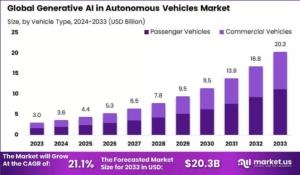Introduction
The Global Generative AI in Autonomous Vehicles Market is rapidly evolving as artificial intelligence technologies become integral to the development and deployment of self-driving vehicles. Generative AI refers to advanced algorithms that can create new data, simulate countless driving scenarios, and predict outcomes based on patterns learned from vast datasets. This capability is critical for autonomous vehicles, which must safely navigate a wide range of real-world situations.
By leveraging generative AI, these vehicles can improve their decision-making, adaptability, and safety, while also accelerating the training and testing process through the creation of realistic synthetic environments. The market is characterized by strong investment in R&D, strategic partnerships among technology leaders and automakers, and supportive regulatory frameworks aimed at advancing autonomous mobility. Major players such as NVIDIA and Waymo are at the forefront, each investing over $2 billion in automotive AI and simulation technologies to enhance the performance and safety of autonomous driving systems.

Key Takeaways
- The global generative AI in autonomous vehicles market was valued at USD 3.0 billion in 2023 and is projected to reach USD 20.3 billion by 2033, growing at a CAGR of 21.1% during the forecast period.
- The market is expected to grow from USD 2.66 billion in 2024 to USD 3.16 billion in 2025 at a CAGR of 18.9%, and further to USD 6.25 billion by 2029 at a CAGR of 18.6%.
- Growth is driven by the expansion of connected cars, advances in big data, AI research, computational power, and the deployment of 5G and edge computing.
- Generative AI enables autonomous vehicles to simulate diverse and complex scenarios, enhancing real-time decision-making, adaptability, and safety.
- Key trends include the adoption of digital twins, natural language processing, generative adversarial networks, and the rise of autonomous delivery services.
- Leading companies like NVIDIA and Waymo have each invested more than $2 billion in automotive AI R&D and simulation environments, underscoring the market’s emphasis on innovation and safety.
- The market benefits from increasing consumer demand for efficient, personalized transportation, and ongoing advancements in autonomous vehicle testing and data annotation services.
Component Analysis
The Global Generative AI in Autonomous Vehicles Market is primarily segmented into solutions and services. Solutions encompass the core products and technologies—such as software platforms, algorithms, and integrated AI systems—that enable autonomous vehicles to simulate, predict, and respond to real-world driving scenarios. These solutions are crucial for applications like training and data augmentation, simulation and testing, perception enhancement, localization and mapping, safety verification, and behavior prediction.
Services, which accounted for over 73% of the market share in 2023, include deployment, maintenance, optimization, and ongoing support for generative AI platforms. As autonomous vehicle technology becomes more complex, specialized services are increasingly vital to ensure seamless integration, regulatory compliance, and continuous improvement of generative AI systems. The dominance of services reflects the industry’s need for expert support in deploying and scaling generative AI across diverse vehicle platforms and operational environments.
End Users Analysis
The main end users of generative AI in autonomous vehicles are automotive manufacturers and research & development organizations. Automotive manufacturers held a dominant position in 2023, capturing over 70% of the market share. Their direct involvement is critical for rapid iteration, real-world testing, and the integration of generative AI into commercial vehicle fleets. Manufacturers leverage generative AI to accelerate model training, enhance safety features, and deliver more personalized and adaptive driving experiences.
Research and development organizations, including academic institutions and technology startups, play a key role in advancing the underlying AI technologies, developing new algorithms, and supporting the validation and regulatory approval of autonomous systems. The collaboration between manufacturers and R&D entities is essential for pushing the boundaries of what generative AI can achieve in terms of safety, efficiency, and scalability in autonomous driving
Key Player Analysis
The Global Generative AI in Autonomous Vehicles Market is shaped by a dynamic mix of established technology giants, automotive manufacturers, and specialized AI innovators, all driving rapid advances in autonomous mobility.
Top Market Leaders
- NVIDIA
- OpenAI
- Waymo (Alphabet Inc.)
- Baidu Apollo
- Aptiv
- Aurora
- Motional
- TuSimple
- Zenuity
- AI Motive
- Applied Intuition
- Ridecell
- Perceptive Automata
- DeepMap
- Idriverplus
- Other key players
Conclusion
The Global Generative AI in Autonomous Vehicles Market is on a trajectory of rapid expansion, driven by the increasing integration of advanced AI technologies that enable autonomous vehicles to simulate, predict, and adapt to complex real-world scenarios. Valued at USD 3.0 billion in 2023, the market is expected to reach USD 20.3 billion by 2033, growing at an impressive CAGR of 21.1%.
The macro analyst desk brings highly sought after financial news based on market analysis, insider news and company filings.
